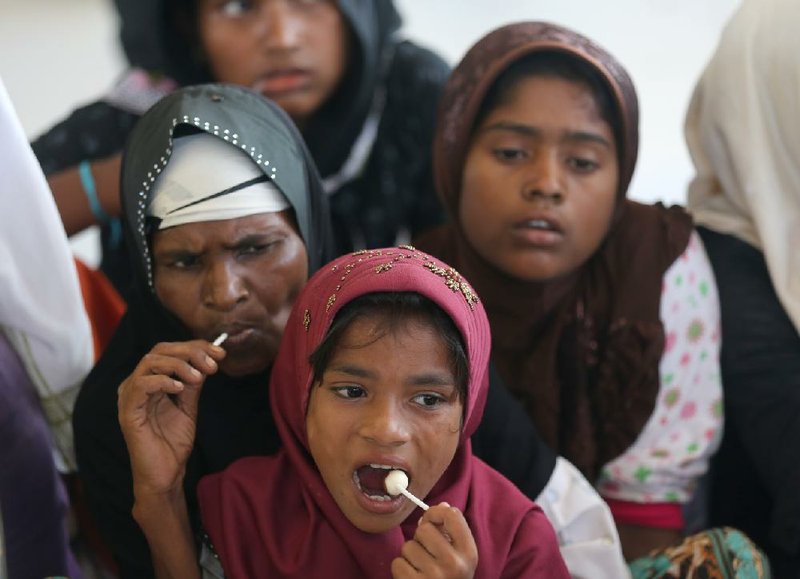JAKARTA, Indonesia -- After a flurry of diplomatic activity, the government of Burma said Thursday that it would send representatives to a regional meeting in Bangkok next week aimed at resolving the continuing humanitarian crisis of people stranded at sea off Southeast Asia and addressing the larger issue of human trafficking.
Burma, which has previously refused to attend any conference that specifically mentions the plight of ethnic Rohingya fleeing the western part of the country, softened its stance after officials held separate talks Thursday with the visiting foreign ministers of Malaysia and Indonesia.
In addition, Antony Blinken, the U.S. deputy secretary of state, discussed the crisis in a meeting Thursday with President Thein Sein in Naypyidaw, the country's capital, said U Zaw Htay, deputy director-general of the president's office.
On Wednesday, Malaysia and Indonesia announced that they would temporarily shelter an estimated 7,000 to 8,000 people from Burma and Bangladesh languishing aboard wooden boats in the Andaman Sea and Strait of Malacca until they are either resettled in a third country or repatriated within a year.
Tens of thousands of Rohingya, members of a Muslim ethnic group who live primarily in Rakhine state in Burma, have fled ethnic violence and persecution there during the past several years, with most going to Malaysia or Bangladesh.
The government in Burma does not recognize the 1 million Rohingya Muslims inside its borders as citizens, referring to them as "Bengalis," and implying they are from neighboring Bangladesh, refusing to accept any of them back.
Thailand, which will host the May 29 meeting, agreed to help address the crisis, which is well into its second week, after talks with Malaysia and Indonesia on Wednesday, but it did not pledge to take in any more people.
Htay said Burma had agreed to attend the Bangkok meeting only after being assured that the term "Rohingya" would not be used.
"The term 'irregular migrant' will be used instead," he said. "They can't pressure us. We won't accept any pressure. We need the right approach to resolve the problem."
Arrmanatha Nasir, a spokesman for the Indonesian Ministry of Foreign Affairs, said Burma also had confirmed its willingness to support regional efforts to resolve the issue, including tightening its borders "so there's no outflux of migrants."
Nasir also said Burma would send officials to the Indonesian island of Sumatra to verify the identities of Rohingya currently being cared for in four camps there.
Burma is often called Myanmar, a name ruling military authorities adopted in 1989.
The United States has offered to help finance international humanitarian aid efforts already underway for an estimated 3,500 people who have reached Indonesia, Malaysia and Thailand, as well as those still out at sea. Washington has indicated that it would be willing to permanently take in some of the Rohingya, in addition to helping others resettle in a third country.
There was also a report in The Dhaka Tribune, in the Bangladeshi capital, that the small West African nation of Gambia, which is predominantly Muslim, has offered to take in all the Rohingya, with international assistance.
While the Rohingya at the center of the current crisis are likely to receive official U.N. refugee status, the Bangladeshis are considered economic migrants and will be repatriated, according to officials from the Office of the U.N. High Commissioner for Human Rights and the International Organization for Migration.
After two consecutive days of ships packed with people landing or being rescued off the coast of Sumatra, no boats were reported to have landed or been rescued at sea in Southeast Asia as of Thursday night. However, The Associated Press reported that Malaysia had said that four of its navy ships were actively searching for stranded vessels.
Joe Lowry, a spokesman in Bangkok for the International Organization for Migration, said aid agencies were increasingly worried about the health of the several thousand people still on boats given the condition of those who arrived ashore in Indonesia on Tuesday and Wednesday.
"They were beyond the point of suffering," he said of the arrivals.
First Adm. Amarulla Octavian, chief of staff of the Indonesian navy's Western Fleet command, said Thursday that its vessels were patrolling in and around the Strait of Malacca and would help any boats they found in distress.
Before Wednesday, Indonesia, Malaysia and Thailand's navies had pushed back boats filled with travelers from their territorial waters.
Information for this article was contributed by Wai Moe of The New York Times.
A Section on 05/22/2015

